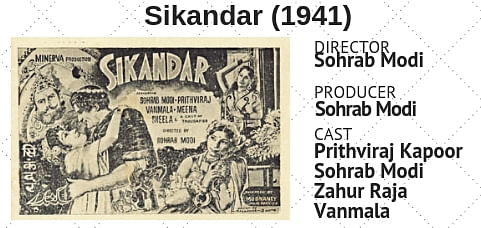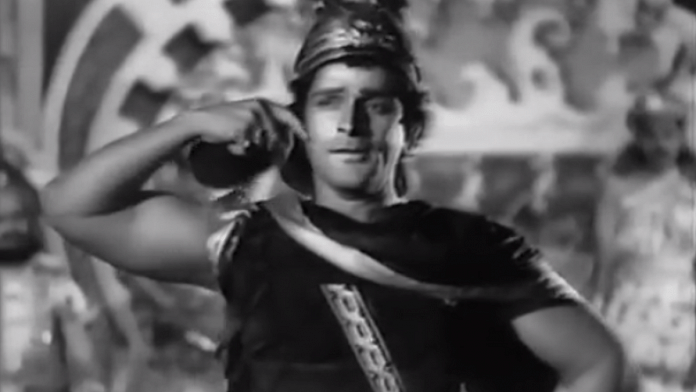Bollywood started with Prithviraj Kapoor. He was one of the country’s foremost actors, and even played a role in India’s first talkie in 1931. He was an exceptional thespian. The head of the famous Kapoor family of Bollywood, Prithviraj was the quintessential Hindi cinema hero on the silver screen. And perhaps his most famous role was in 1941 epic, Sikandar, where he played Alexander the Great. On his 48th death anniversary, we look at the film that cemented his position as one of the greatest actors of all time.
 Sikandar tells the tale of Alexander not just as a great warrior and emperor, but also a man with flaws. He is arrogant and selfish — qualities that cost him. Sikandar refuses to listen to his generals, dismisses reality and ignores the warnings of his mentor – Aristotle.
Sikandar tells the tale of Alexander not just as a great warrior and emperor, but also a man with flaws. He is arrogant and selfish — qualities that cost him. Sikandar refuses to listen to his generals, dismisses reality and ignores the warnings of his mentor – Aristotle.
A lot of Sikandar’s pride and ego comes from his long list of achievements, and to an extent, it is justified, but when he is almost killed by King Porus in battle, the old adage of vanity being the fall of man comes to mind.
The theatre actor in Prithviraj Kapoor popped in this larger-than-life role on screen. His curly hair, Greek clothing, and aura of grandeur added to his act.
The film is a re-telling of Alexander’s conquest of Persia and northwestern India. It’s straight-forward and mostly sticks to historical facts, sometimes peppered with fictional elements. Directed by Sohrab Modi, who also stars as King Porus, Sikandar was a lavishly mounted film in Bollywood. The palatial setups were magnificent and luxurious. The battle scenes were shot across Kolhapur, using hundreds of extras and animals, and it was on a scale that Indian audiences hadn’t experienced before. Sikandar also starred Vanamala Devi as the strong and intelligent Rukhsana, Alexander’s love interest. She shows that women aren’t mere ‘distractions’ to be dealt away with. Sohrab Modi’s Porus is also formidable, and a true match to Alexander, albeit losing to him finally.
https://www.youtube.com/watch?v=LclvEutRgK8
The film’s battle scenes are a delight to watch, especially when you think about the lack of technology at the time. Stunts were performed manually, and by the actors themselves. Apart from the skilled sword-fighting, horses and elephants are also used to great effect. It reminds you of historical epics that came out in the last 10 years, until you realise that they probably got their inspiration from Sikandar.
The film also has historical significance in India, as it was released during a period of war and upheaval in the country. World War II was going on, as was the Quit India movement. Gandhi’s civil disobedience movement was gaining ground. Sikander’s strong nationalistic message was said to have ignited similar sentiments in the public. Sikandar became such a big hit that it was eventually banned in some British Indian army cantonments. It was revived, of course, and continued to entertain and inspire Indians of all ages.
Also read: When Nehru’s India banned a story on Gandhi’s murder and Godse’s past




He looks exactly like Shashi Kapoor in this photograph.